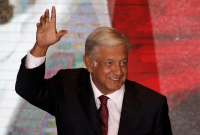Support strong Canadian climate journalism for 2025
Mexico's president says his government has reached a deal with private natural gas pipeline operators, including Canada's TC Energy Corp., to solve a dispute over fees and payments.
The pipelines allow Mexico to import U.S. natural gas and distribute it throughout the country, but President Andres Manuel Lopez Obrador has said the companies took advantage of previous administrations when the contracts were signed.
Lopez Obrador acknowledged Tuesday that the dispute with companies from the U.S., Canada and Mexico could potentially harm his country's reputation among investors.
"We avoided a dispute that would have implied going to international tribunals, a dispute that would have taken years to resolve and which would have generated an atmosphere of mistrust toward the government and toward Mexico at a time when we need investment," he said.
In June, former Canadian ambassador Pierre Alarie wrote "I am deeply concerned by the actions of the CFE (Federal Electricity Commission) and the signal they send that ... Mexico will not respect the gas pipeline contracts."
The dispute involves seven pipelines, some of which are completed and some of which are blocked by court appeals or protests. In some cases, those projects have been blocked for months or even years.
In its recent second-quarter financial report, TC Energy said its customer, the Mexican state power utility, had filed in June for arbitration on contracts for three of its natural gas pipelines, seeking nullification of clauses related to force majeure and reimbursement of fixed capacity payments.
The company formerly known as TransCanada said it had completed construction and commissioning for its Sur de Texas gas import pipeline but had not yet been allowed by the regulator or customer to begin service.
Meanwhile, construction was continuing despite delays on its Villa de Reyes pipeline to be completed later this year and its Tula project, where the targeted completion date has been pushed back to the end of 2021.
"In our view, the contracts were properly established in accordance with all original bid and regulatory requirements and remain valid and enforceable," TC reported. "We will defend them as necessary through the arbitration proceedings."
TC did not immediately return a call requesting comment on Tuesday.
On Tuesday Lopez Obrador welcomed business magnate Carlos Slim, Mexico's richest man, to his daily morning news conference and praised the companies for taking what he claimed were 30 per cent lower profits, in exchange for changing fee structures to a flat rate. The term of the contracts will also be extended, apparently in some cases from 25 to 30 years.
López Obrador said the deal would save Mexico — especially the CFE, the national electricity utility, the biggest single consumer of gas — as much as US$4.5 billion over the next three decades.
Slim suggested that more up-front income in the contracts would allow the companies financing advantages. Slim's Carso Energy was one of the builder-operators of the pipelines.
The rest include companies like Calgary-based TC Energy and IEnova, a subsidiary of U.S. Sempra Energy. An agreement with a fourth, Mexican, company is still pending.
In a statement, IEnova said "the agreement would not have been possible without the direct and personal intervention of the president."
"This agreement is the result of compromises on both sides, to take advantage of infrastructure that is essential to bring natural gas to millions of Mexicans and the country's industry."
While pipeline construction has sparked confrontations in many countries, in Mexico such conflicts are particularly intractable. As a result, Mexican electricity rates and gas prices are much higher than in the United States, despite the proximity of the two markets.
Companies in this story: (TSX:TRP).
With files from The Associated Press





Comments